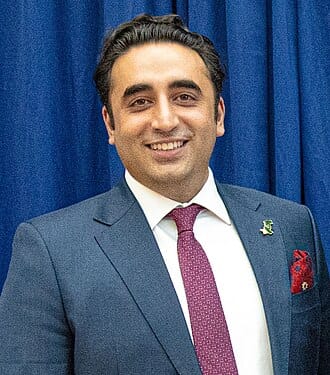Bilawal Bhutto Zardari represents a new generation of leadership in Pakistan. As the chairman of the Pakistan People’s Party (PPP) and the son of Benazir Bhutto and Asif Ali Zardari, Bilawal carries a legacy that intertwines with the political history of Pakistan. His journey reflects ambition, determination, and a commitment to the values of democracy.

Early Life and Education
Born on September 21, 1988, in Karachi, Bilawal grew up in a politically charged environment. As the son of former Prime Minister Benazir Bhutto and former President Asif Ali Zardari, he was exposed to politics from a young age. After the tragic assassination of his mother in 2007, Bilawal became even more aware of the challenges and responsibilities that came with his family’s legacy.
Bilawal pursued his education at prestigious institutions, including the University of Oxford, where he earned a degree in History. This academic background provided him with a strong foundation for understanding the complexities of governance and politics.
Political Ascendancy
Bilawal was thrust into the political spotlight when he was appointed the chairman of the PPP in 2007 at just 19 years old. Despite his youth, he demonstrated an eagerness to honor his mother’s legacy and continue her vision for Pakistan. He quickly became a prominent voice for the party, advocating for social justice, democracy, and women’s rights.
Challenges and Leadership
Navigating the political landscape of Pakistan is no easy task, especially for someone with such a significant legacy. Bilawal faced numerous challenges, including skepticism from both political rivals and segments of the public. However, he has consistently emphasized the need for unity and reform within the party and the country.
In recent years, Bilawal has focused on issues like economic inequality, education, and health care. He aims to connect with the youth of Pakistan, recognizing their potential to shape the future of the nation. His ability to communicate effectively and engage with younger voters has made him a relevant figure in contemporary politics.
Advocacy and Public Engagement
Bilawal has been vocal about various social issues, using his platform to raise awareness on topics such as climate change, women’s rights, and minority rights. His commitment to progressive values resonates with many who seek change in Pakistan. Through public speeches and social media, he has positioned himself as a leader willing to challenge the status quo.
His involvement in national politics also includes participating in key legislative discussions and advocating for reforms aimed at improving governance. Bilawal’s leadership style emphasizes collaboration and dialogue, aiming to unite different factions within the PPP and beyond.
Future Outlook
As Bilawal continues to grow as a leader, the future of the Pakistan People’s Party rests on his shoulders. His ability to navigate the complexities of Pakistani politics will determine how effectively he can carry forward his family’s legacy. Many view him as a beacon of hope for a new generation of political leaders who can drive meaningful change.
Conclusion
Bilawal Bhutto Zardari’s journey in Pakistani politics is just beginning, but he already carries the weight of a significant legacy. With his commitment to social justice and democratic values, he is poised to play a crucial role in shaping the future of Pakistan. As he navigates the challenges of leadership, his vision and determination will be vital in continuing the Bhutto family’s quest for a more equitable and democratic society.


